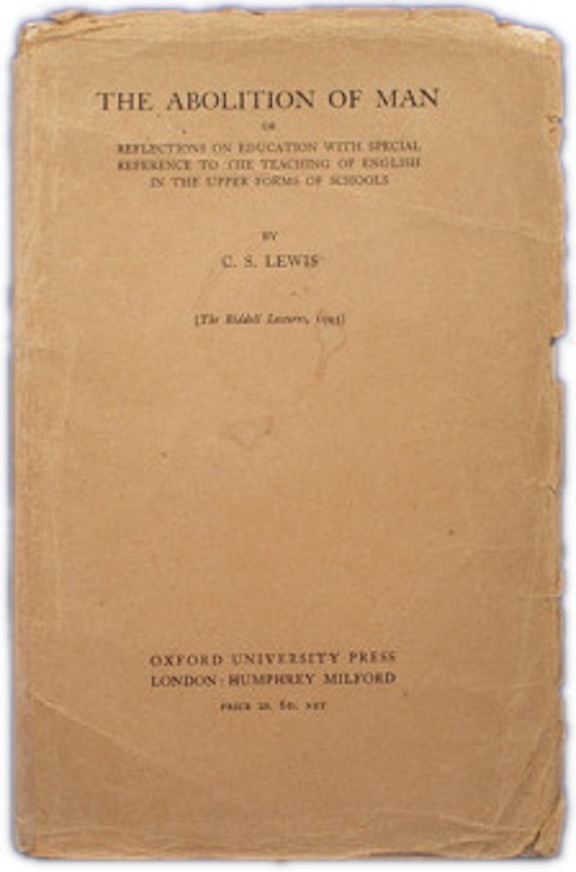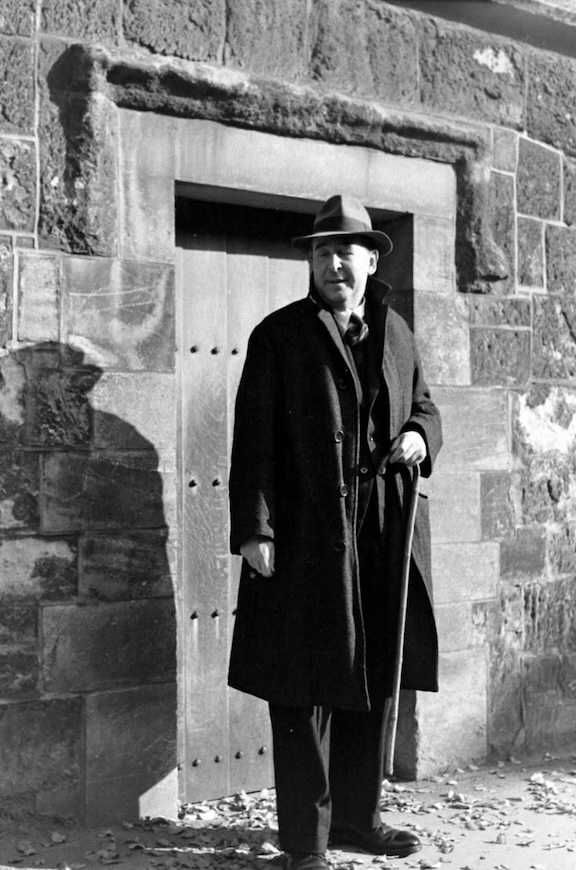There is a short section in C.S. Lewis’ classic, The Abolition of Man, the 80th anniversary of whose publication we recently observed, that sheds some light on the current debates in the Catholic Church regarding what constitutes a correct understanding of the development of doctrine. Unlike his fellow countryman John Henry Newman, Lewis did not address the question of doctrinal development directly. Nevertheless, what he has to say in Abolition about progress in language and in traditional morality provides some valuable insights into the question of the development of Christian doctrine.
In Abolition, Lewis, who I believe can fairly be described as an Anglican with strong Catholic sensibilities in the way he thinks about the world, offers a vigorous defense of natural law, what he calls the Tao, in the face of what in another context he labels the poison of subjectivism. Having strongly affirmed the objective, universal character of these first principles of practical reason, Lewis poses this question: “Does this mean, then, that no progress in our perceptions of value can ever take place?” On the contrary, he argues, “some real development is required.” But what constitutes genuine development as opposed to a corruption, a mere break with traditional morality?
Before he tackles that question as it applies to morality, and almost as an aside, Lewis addresses its application in the realm of language, a topic about which he knew a great deal. Here he compares how a theorist of language approaches his native tongue versus how a great poet might do so.
The theorist, Lewis writes, approaches language “from outside,” and makes alterations in its idiom or spelling based on considerations external to the language itself. Lewis mentions scientific accuracy and commercial convenience as two examples of such external considerations.
By contrast, the great poet “works from within” the language to bring out its potentialities; Lewis points here to the difference between Shakespeare and basic English. It is the language itself that inspires the changes, not some outside consideration. In other words, the change is “organic,” in contrast to the “surgical” approach of the linguist.
Lewis’ description of organic change in language closely resembles what then-Cardinal Ratzinger had to say about liturgical development in The Spirit of the Liturgy, his magisterial treatment of the subject: “There can be a thoroughly living kind of development in which a seed at the origin of something ripens and bears fruit.”

Similar to linguistic development, Lewis argues, “the Tao admits development from within.” When it is done in the spirit of the Tao, moral advance is possible; otherwise, it is “a mere innovation.”
Nietzsche, Lewis states, was a mere innovator because he broke radically with the Tao and espoused a morality from the outside. By contrast, Lewis considers the development from the Confucian Silver Rule to the Golden Rule an instance of a real advance. That is so because the latter (“Do as you would be done by”) is an organic extension of the principle contained in the former (“Do not do to others what you would not like them to do to you”).
As Lewis asserts, “From within the Tao itself comes the only authority to modify the Tao.”
He dealt with the idea of organic development at much greater length in one of his later works, The Four Loves. There he borrows the principle from The Imitation of Christ that “the highest does not stand without the lowest,” and elaborates on the notion of genuine progress in morality, taking up in turn different facets of love, including affection, friendship, eros, and charity.

In the short section mentioned above in Abolition, he provides few examples, though he does offer an interesting observation that nicely encapsulates his thinking on the topic: “It is Paul, the Pharisee, the man ‘perfect s touching the Law’ who learns where and how that Law was deficient.” (Philippians 3:6) St. Paul is here simply following the example of his Master, who stated that he had not come to abolish the Law, as Nietzsche proposed to do, but to fulfill it, that is, to deepen it from within and extend its reach. Again, the development is an organic one, from the inside.
Lewis recognizes that the line between distortions and genuine development is at times not clearly marked out, and he observes elsewhere that these matters do not lend themselves to mathematical precision. Here he writes: “In particular instances it may, no doubt, be a matter of some delicacy to decide where the legitimate internal criticism ends and the fatal external kind begins.” Frontal attacks are easier to detect, he notes, but others – such as the claim that the practice or principle in question conflicts with an even more fundamental precept – are much more difficult to discern.
So, if there are no precise mathematical formulas for making such determinations, what are we to do? What is required to make sound moral judgments, Lewis contends, is deep training in the virtues. For only when these virtues have been internalized and become second nature will we be able to make such determinations. As Lewis writes, referencing Plato’s Republic (and likely Dante as well), “Only those who are practicing the Tao will understand it. It is the well-nurtured man, the cuor gentil, and he alone, who can recognize Reason when it comes.”
The equivalent, with respect to the development of Christian doctrine, is one who is steeped in the Great Tradition as expressed in the Deposit of Faith rather than, say, in sociological analysis, however appropriate that may be in certain contexts.
As our Lord instructed his disciples, it is the scribe who has been well trained for the kingdom of heaven who, like a master of the house, “brings out of his treasure what is new and what is old.” (Matthew 13:52)















